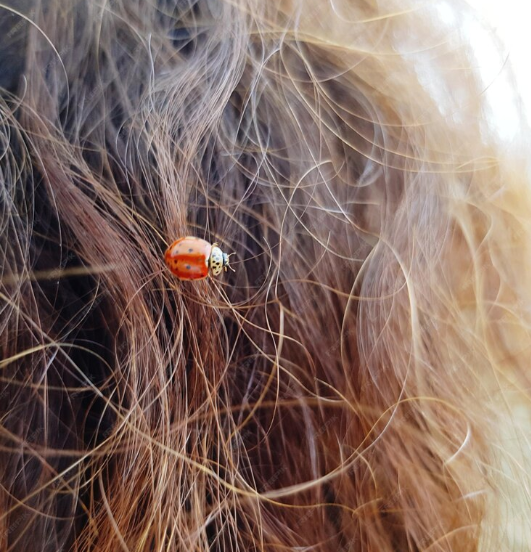Introduction
Fleas are tiny critters that can turn your nice and peaceful household into a fest of itching and scratching. Despite their small size, they pack a punch when it comes to disrupting the comfort of both you and your pets. These absolute nightmare creatures often hitch a ride on your pet’s fur, but what if they make their way into your locks?While it’s rare, it’s not impossible for fleas to find their way into human hair. Though they don’t thrive there as they do on your pets, they can still cause a great deal of discomfort. The good news is that you can take steps to rid your hair of these pests for good. With the right approach, you can restore the peace in your home and keep those fleas from turning your life upside down.
Where can fleas live
Fleas are incredibly adaptable creatures that can thrive in many different environments. While they are often an issue for furry pets like cats and dogs, they aren’t too picky about where they settle. These pests can be found lurking in carpets, bedding, and upholstery, as well as in outdoor areas around your home.
Flea eggs, larvae, and pupae can even hide in the cracks and crevices of your house, especially in darker areas where they feel safe Getting rid of a flea infestation can be a real challenge, as these pests favour the hidden spots in our homes. But don’t worry, with a bit of persistence, you can completely eradicate them and stop the itch for good.
Fleas In Human Hair: Treatments And Home Remedie
Fleas are a common risk for anyone with pets, and finding them in human hair can be especially worrying. These tiny pests feed on the blood of their hosts and typically infest animals like cats and dogs, but they can also bite humans. While fleas may not survive long in human hair, they can still cause allergies and transmit diseases. To get rid of these pests, it’s important to focus on both prevention and treatment.
The prevention of a flea infestation in human hair begins with proper care of your pets. Fleas live in the furs of animals, using them as vectors to reach other hosts. If you notice any signs of fleas on your pets, such as excessive scratching or visible flea dirt, it’s crucial to act promptly.
Treat your pets with effective flea control measures like the ones used for Cat fleas (Ctenocephalides felis) and Dog fleas (Ctenocephalides canis), which are commonly found on cats and dogs.For humans, fleas are generally more of a temporary problem. The short answer is that while fleas can jump onto human hair, they don’t breed there due to the lack of warmth and density they need. If you do find a flea in your hair, stick to simple steps like washing your hair thoroughly and using a fine-tooth comb to rid your hair of any lingering pests. With the right approach, you can say bye to fleas and keep them from becoming a persistent issue.
How Do You Know If You Have Been Infected By Fleas?
If you start feeling intense scalp itching or notice red welts, bumps, or even pus-filled blisters on your neck or scalp, these could be symptoms of flea bites. Some individuals who are allergic to flea saliva might also experience severe irritation and redness, often leading to scalp inflammation. If these symptoms persist for more than 3 days, it’s essential to consult a doctor or a dermatology expert. It can be difficult to distinguish between human and animal fleas without the proper tools, like a microscope, or the necessary knowledge of their anatomy.
If you find darkish red fleas that are typically found on animals around your home, it might indicate that someone who owns a pet has been nearby. These fleas can jump up to two feet, which means they could be on your furniture, carpets, or even in your hair. Humans generally get a different type of flea, which is smaller and white, with their eggs or nits that attach to a single hair strand.
To treat this problem, you can use special types of shampoos available in any grocery store with a first aid department. These shampoos are designed to rid your hair of fleas and prevent further infestation. Always be cautious and keep an eye out for the symptoms mentioned above to address the issue quickly and effectively.
How To Treat Fleas In Human Hair?
Treating fleas in human hair requires a careful approach to ensure complete removal. Start by using a shampoo that specifically washes out fleas from the roots of your hair. Gently massage the shampoo into your scalp and wait for about 2 to 3 minutes to let the active ingredients work. After that, use a wide-tooth comb or your fingers to remove any remaining fleas. This helps in getting rid of both the fleas and any eggs that might be present.
For a more natural approach, you can try Tea Tree Oil or Apple Cider Vinegar. Adding a few drops of tea tree essential oil to your shampoo can help curb a flea infestation. This oil is traditionally used and research suggests it is effective in managing fleas. Alternatively, mix Apple Cider Vinegar with water in a 1:1 ratio and spritz it on your hair. Leave it for 15 minutes before rinsing with warm water. This remedy is widely believed to help eliminate fleas and reduce scalp itchiness.
Another remedy involves using Baking Soda, a natural and non-toxic option. Simply mix 2 tablespoons of baking soda with 10 ml of water to create a thick paste. Apply this mixture to your scalp and gently massage it with your fingertips. Leave it on for 10 to 15 minutes before rinsing with lukewarm water. Alongside these treatments, it’s important to clean your house thoroughly, including pillows, sheets, and other areas where fleas might survive. This helps prevent any lingering pests from causing a re-infestation.
Precautions To Prevent Fleas
It’s possible for your pets to get infected with fleas and ticks, which can lead to a serious infestation if not addressed quickly. To protect your home and your pet, start with regular bathing using a specially formulated shampoo. This helps to rid them of any fleas and ticks. Use a flea comb during the bath and wear gloves to avoid direct contact. If the infestation seems severe, it’s important to seek veterinarian advice for the proper treatment.
Keeping your home clean is also crucial. Regularly wash your pillows, linen, towels, and clothes to remove any lingering fleas. Don’t forget to disinfect pet beds, toys, mats, and even hats, headgear, and other accessories. Sunlight can be a natural disinfectant, so leave these items out for a few hours. Consider using tea tree oil or apple cider vinegar sprays on these items to further help remove fleas. Vacuum your carpets, curtains, rugs, and couches thoroughly, and if needed, call in pest control for a more serious infestation. Make sure to clean and close open garbage spaces around your home, as they can be a source of flea problems.
Prevention is key to keeping your home flea-free for good. Dr. Zoe Costigan, Head Vet at Itch, recommends using flea preventatives for your pets year-round, regardless of the weather or season. Fleas can become active even during the colder months when heating can cause dormant flea pupae to hatch. Maintaining a regular cleaning routine will help catch these fleas early and kill them before they hop onto your pet. Paying attention to areas where your pet spends time, like under the curtain or behind the sofa, is essential. Additionally, consider pet-friendly repellents in your garden and keep your grass short to minimize the risk. If you’re vigilant, you can prevent a minor issue from turning into a full-blown infestation.
F&Q
How long will fleas live in human hair?
It’s unlikely that a flea will stay on your body for a substantial amount of time. Humans lack the fur or feathers that animals and birds have, which are necessary for fleas to lay eggs and repopulate on a regular cycle. Typically, you would wash or scratch off a flea before they have a chance to breed.
Will a shower get rid of fleas on humans?
Showering alone may not completely remove fleas from your body, but it can help reduce their numbers. To effectively deal with an infestation, it’s important to also focus on washing your clothes and bedding in hot water. This helps to minimize the flea infestation, even if it’s just for a little while.
Can fleas lay eggs in human hair?
It’s unlikely that fleas will lay eggs in human hair. While cat fleas don’t typically breed on humans, in a natural setting, the females require a specific diet of human blood to produce eggs. Additionally, fleas can only jump to the height of a person’s ankle, making it even less likely for them to target human hair for breeding.


